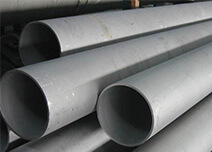- SITEMAP
- CONTACT US
- 8618267732328
News
Credibility ,the lifeblood of enterprise!
- Fittings
- Butt Welding Fittings
- Forged Fittings
- 180 Degree Elbows
- 90 Degree Elbows
- 60 Degree Elbows
- 45 Degree Elbows
- 30 Degree Elbows
- Equal Tee
- Reducing Tee
- Concentric Reducer
- Eccentric Reducer
- Lap Joint Stub End
- Outlets
- Cap
- Bend
- Cross
- Coupling
- Stainless Steel Lateral Tee
- Bellows Expansion Joints
- Flexible Metal Hose
- Non-Standard/Custom Fittings
- Bleed & Flushing Rings
- Types of Flanges
- Anchor Flanges
- Blind Flanges
- Expander Flanges
- High Hub Flanges
- Lap Joint Flanges
- Long Weld Neck Flanges
- Nipoflanges
- Orifice Flanges
- Plate Flanges
- Ring Type Joint Flanges
- Reducing Flanges
- Slip On Flanges
- Socket Weld Flanges
- Spectacle Blind Flanges
- Square Flanges
- Spades & Ring Spacers
- Threaded Flanges
- Welding Neck Flanges
Stainless Steel for Hardness and Corrosion Resistance By yaang.com
Stainless steel is probably the least understood. Selecting the right stainless steel for your application can be perplexing. Here we tell you differences between various stainless steel alloy. Hope help you to select the most appropriate material for specific application. The focus of this issue is on the stainless steel and related alloy that combine a high degree of hardness,corrosion resistance, low cost and availability. It is intended for the designer need to specify material on the drawing.
Stainless Steel 52100
The alloy is homogeneous so that all of the chromium is available for corrosion resistance. The alloy melts clean and heat treats beautifully so high cycle fatigue strength is good and the alloy supports high rolling contact stress. Good quality stock is easily purchased. QC requires checking decarb in as-received stock and after heat treating checking decarb and grain size.
Stainless Steel 440C
It is hard. The alloy has big, blocky, primary carbides. The matrix chromium is only a little higher than H13's so its corrosion resistance is only a little better than H13. The primary carbides make for noisy rolling contact, markedly lower rolling contact fatigue strength, fairly good compressive strength, and poor tensile properties. There are very consistent supplies of good quality. QC requires monitoring the heat treater's results for excessive austenite grain boundary precipitation, prior austenite grain size, primary carbide particle size and retained austenite.
Stainless Steel H13
Not as clean as 52100 so its rolling contact fatigue strength isn't quite as high but its higher chromium gives pretty goodcorrosion resistance. Hard to buy good quality and hard to heat treat well. QC requires monitoring incoming steel for segregation and monitoring the heat treater's results for austenite grain size and precipitation in the austenite grain boundaries.
Stainless Steel 17-4PH
This compromise has better corrosion resistance, good toughness when properly heat treated, and lower hardness. Coarse grain can be a problem.
Commercial stocks seem to be good quality. QC requires monitoring the heat treater's results for austenite grain size, precipitation in the austenite grain boundaries and through-thickness hardness. Hardness after the solutionizing heat treatment needs to be checked, which is the usual as-purchased condition for small quantities. Segregation can be a problem.
Stainless Steel 420
The alloy has good corrosion resistance and pretty good hardness. However, it heat treats with a coarse grain, which makes it somewhat unpredictable and reduces the fatigue strength and rolling contact stress. It is moderately easy to purchase good quality. QC requires monitoring segregation and grain size after heat treating.
Hard worked Stainless Steel 304
High hardness and strength with pretty good corrosion resistance are available in heavily cold worked type 304. It has much less toughness than annealed 304 but it is right up there with the other hard stainless steel tube. Wire, small stainless stel bars and small strip dimensions are available. Quality control includes surface finish, which can be scaly on a microscopic scale.
Other hard stainless steel include:
- 416 for improved pitting resistance
- 440A and 440B for better homogeneity than 440C but still suffer from primary carbides
- 17-7PH for more of the same as compared to 17-4PH
The growing family of fully densified powder metals gives great opportunities for combining all the properties except affordability. In a critical application, where the metal cost can be absorbed, be sure to look over what's available. We see these fully densified powder metals in a frustratingly limited range of small stainless stel bar stock sizes.
An example of compacted powder metal stainless stel bar stock is Crucible Materials Corporation's CPM T440V which has 17% chromium along with other good things. The powder process keeps the carbides fine as long as the heat treater doesn't mess it up during final heat treating after machining. The heat treater's results must be monitored for carbide and grain size or the product isn't any better than the regular ingot and strand cast mill product.
Source: Yaang Pipe Industry Co., Limited (www.yaang.com)

Tel No:+86-18267732328 / Email:[email protected]
Address:Longwan District, Wenzhou, Zhejiang Province, China.
Copyright Notice © www.yaang.com Yaang Pipe Industry Co., Limited All rights reserved.
Yaang Pipe Industry Co., Ltd. is an international supplier of piping solutions for flange, butt welding fittings, socket welding fittings and threaded fittings. Our products are widely used in different industrial fields, including oil and gas, chemical industry, petrochemical industry, power plant, pulp and paper industry, environmental and water conservancy engineering, engineering projects, etc.





